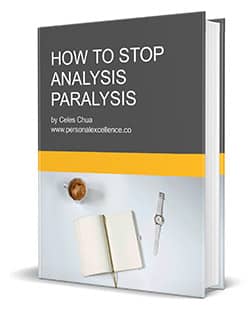
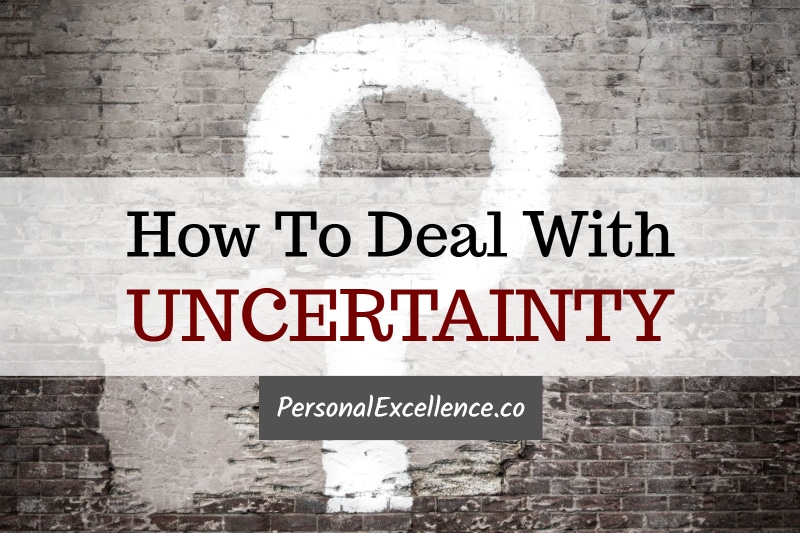
Are you feeling uncertain about life now? Are you facing uncertainty in your work, health, relationships, or other life areas? In my last newsletter, I shared how to make hard decisions. Today’s post is about addressing uncertainty.
Whether it’s moving to a new country, changing jobs, or dealing with health problems, there are times in life when we are caught in uncertainty.
But as humans, we seek clarity and control. So when we face uncertainty, we feel unsettled. We think about the worst-case scenario and play it over and over in our minds. Some of us freeze and panic; some of us become depressed; others give up and do nothing.
While it’s normal to worry, prolonged worrying is unconstructive and does little to solve the problem. There are steps you can take to deal with uncertainty, whether in terms of action or mindset change. Today I share six tips to address uncertainty.
Tip 1: Focus on what you can do
First, focus on what you can do.
It’s normal to feel helpless when we face situations that are out of our control. A pandemic, a retrenchment, a negative health diagnosis, and a divorce are examples of events that can make anyone feel powerless, like our life is not our own.
But in every situation, there is always something you can do. What can you do? Work on them. Don’t focus on the things you can’t control, but focus on the things you can control. If you do nothing, nothing will improve. But if you focus on the things you can do, and work on them, things may get better.
For example, in a retrenchment, you can’t change the fact that you just lost your job. But you can control how much time and effort you spend looking for a new job. You can improve your resume, contact headhunters, join job boards, and network with people in your industry. You can control your attitude toward your layoff, which will in turn affect the opportunities that come your way.
Likewise in a negative health diagnosis, you can’t change the fact that the illness is currently there. But you can research the illness, join online forums, and connect with those with the same condition. You can research therapies that have helped others get better, and there are many people who have healed themselves from what were declared to them as incurable diseases. You can take action to heal yourself, or if not possible, work on managing your symptoms and living a meaningful life despite your health.
Similarly in a divorce, you can’t change the fact that the marriage has come to an end. But you can work on planning your life after divorce, setting new goals as a single, and connecting with loved ones for support. If you have kids, focus on raising them in a positive and loving environment despite the divorce.
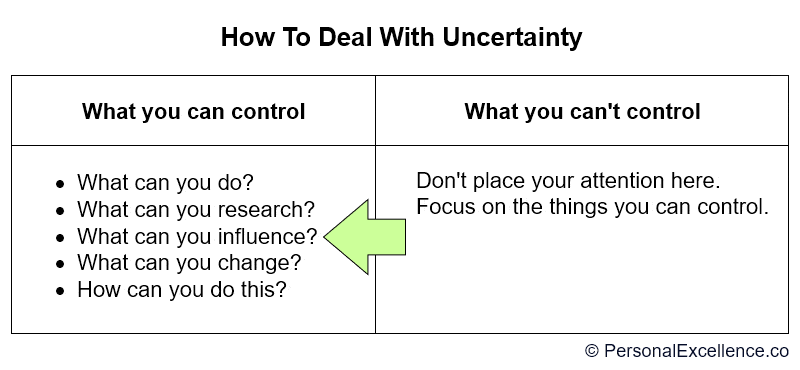
Table: How To Deal With Uncertainty (© PersonalExcellence.co)
The goal is to shift from an external locus to an internal locus of control. External locus of control means perceiving external factors to have more control than you over your life. Internal locus of control means perceiving yourself to have more control than external factors over your life.
While life is not perfect and unexpected things can happen — things that are not your fault and not caused by you — having an internal locus of control helps you take charge of your life. When you adopt an internal locus of control, you focus on the things you can do to make a difference, and try to move things to a better path.
Recognize that even in great uncertainty, you still have power over yourself, your attitude, and your actions. Even if there is seemingly nothing you can do, you can change your attitude, manage your stress levels, and address your emotions. There are still things you can do and control, and it is by focusing on them that you return to the driver’s seat of your life.
Tip 2: Have a backup plan
Part of the issue with uncertainty is that there is a lot of variance in what may happen — particularly the downside. We have no idea what’s going to happen next and it can feel like we are walking in the dark.
Rather than let the uncertainty take over you, create a backup plan so that you know what to do if the worst-case scenario happens. First, it limits the downside you may face by making you think and plan ahead. Next, it mentally prepares you for the worst-case scenario. Lastly, it gives you peace of mind so that you can focus on dealing with the problem, rather than keep worrying about what to do if the worst thing happens.
When I quit my job to start my business Personal Excellence years ago, I was initially anxious about the future. I was worried that I wouldn’t earn any money even after pursuing my passion for a year — meaning I had failed and had to return to a job I didn’t love.
After worrying for a while, I decided to sit down and address my concerns. The bulk of my worries was uncertainty over my cash flow and business success. So I asked myself:
- How can I ensure my business will definitely succeed?
- What should I do if my business doesn’t bring in money after six months? (I had set the time period at six months so that I would have time to regroup if things didn’t work out.)
My goal was to focus on the things I could control, rather than the things I couldn’t control.
With 1), my answer was to work on my business strategy, develop my coaching skills, create the best content, and build traffic, among many other actions. As for the other things I couldn’t fully control — such as whether I would be featured in the media and whether my articles would rank #1 on Google — I would do my best but not worry about them.
With 2), my answer was to return to corporate, earn some money for one to two years, and then quit to work on my business. And to do this again and again until I succeeded.
When I planned this path, suddenly the worst-case scenario of failure didn’t seem scary to me. I knew I had a plan if I didn’t earn any money, and my worst-case scenario of zero income was covered. By doing this, I could fully devote myself to my business without worry. Personal Excellence soon gained traction and the rest was history.
It’s the same for other situations. If you’re dealing with a job loss, prepare for a scenario where you don’t find a job for the next six months. What would you do? Perhaps you can look for jobs in other sectors, step up on your networking, and take on part-time work until you find a full-time job. Financially, cut down your expenses to the minimum. Get a bank loan if necessary to tide you over.
With health problems, prepare for a scenario if things don’t get well. What would you do? What would you want to do with your loved ones? Think about your will, to avoid the stresses of estate administration down the road. While these are things no one wants to think about, thinking ahead can sometimes set our minds at ease and let us focus on getting well.
With a divorce, perhaps one of your fears is never finding someone compatible. What if you don’t find someone? What would you do? How would you live your life? How can you create your best life ever? Interestingly it is by living our best life as an individual that we then attract the right person, something that I teach in my course Soulmate Journey.
Tip 3: Live your life as best as you can, despite the uncertainty
Thirdly, live your life as best as you can, despite the uncertainty.
Ask yourself: “How can I live my best life despite the situation?” Then, do that. Because when you let your life be ruled over by the uncertainty, you give power to it. But by living life as you would — to the best of your ability — you regain power over your life.
Shannen Doherty is an American actress with Stage 4 breast cancer. She was initially diagnosed with breast cancer in 2015 and went into remission in 2017, but in 2019, discovered that her cancer had returned as Stage 4.[1]
Despite her illness, she has focused on working, living, and being an advocate for cancer survivors. Since 2020, she has filmed a series of productions including BH90210, Dying to Belong, and List of a Lifetime. In January 2023, she discovered that the cancer has spread to her brain, yet she is starting a podcast after the fact.[2][3]
She says, “Stage 4 cancer, it doesn’t mean the end of your life. It doesn’t mean that you’re not viable in the workplace. It’s quite the opposite. I think we probably work harder than anyone because we have so much more to prove.”[4] “Our life doesn’t end the minute we get that diagnosis. We still have some living to do.”[5]
For you, living your best life may mean something different. It may be working, meeting friends, or being with loved ones. While you battle with uncertainty, try to create normalcy in your life — if possible. While the uncertainty may have disrupted 50, 75, or even 100 percent of your life, getting back a little control — even if just one percent — can help you feel a sense of stability and centeredness.
Tip 4: Learn to accept uncertainty
Many of us have been through the golden age in the 1990s and 2000s[6][7] where there was an economic boom with rising employment and rising affluence.
During this time, job security was the norm, there was certainty in life, and people could focus on working, earning money, and growing in material wealth, without worrying about other things. Health was a given and something to only worry about in old age; marriage resulted in the certainty that your partner was yours for life; and there was no such thing as chronic health conditions, divorce, layoffs, global pandemics, banks collapsing, or massive economic downturn.
But the reality is that uncertainty is a constant in life. The economic boom in the 1990s and 2000s was a temporary period of illusionary stability in the long span of human history. When you look at the entire human history, the only constant has been change. Be it the Agricultural Revolution where humans switched from a nomadic lifestyle to farming, the Industrial Revolution where production switched from being by hand to by machines, or the Information Age where everything is now digitized, we as humans have constantly been dealing with change, whether as an individual or a civilization.
The Covid pandemic gave us a jolt and took us out of our comfort zones. But it is a reminder that nothing is permanent or certain. While we may seek certainty in our life again, and it is normal to do so, remember that there is nothing certain in life. Our health, jobs, investments, finances, business results, and even our homes — all these can change in the next moment.
Plan for a life with stable foundations, but be prepared that things can change. Let go of expectations for things to remain the same. Don’t resist change, but learn to deal with it as it happens. Soft skills like adaptability, ability to react quickly, openness, and willingness to step out of your comfort zone will be important.
Tip 5: Manage your stress levels
There are times when the uncertainty is so much and the problem is so stressful that we remain affected despite doing the above. For example, when we are dealing with a life-and-death situation. When the outcome of something critically important rests on someone else (such as surgery to remove a tumor). When there is no way to get clarity despite your best efforts (such as dealing with a health condition that no one knows about).
In these darkest of times, check in with yourself. How are you doing now? Are you feeling stressed out? If yes, how can you alleviate your stress levels? Perhaps it’s to shut down your laptop and take a break from reading online comments of all the negative scenarios. Perhaps it’s to get a timeout and take your mind off this for a day. Perhaps it’s to talk to a loved one about your worries.
Do something to manage your stress, even if it’s just taking a timeout for a few minutes. Your mental health is important. When you get back, continue to tackle the uncertainty using the steps above.
Tip 6: Do the best you can
Last but not least, do the best you can.
The past few years have been the most difficult years of my life.
- I had a baby and stopped working to dedicate myself to motherhood full-time, with no family help.
- My mother-in-law had a painful struggle with a rare illness for 18 months, during which my family became deeply involved in her care, until she passed away.
- COVID happened which made raising a baby and caring for the ill much more difficult than it already is.
- For the past decade, I faced worsening health problems that medical professionals had no answer for, that I later found out — after years of searching for answers on my own — are due to dental work that I had when I was young, including mercury fillings and a root canal, leading to heavy metal poisoning and other issues.
- My husband faced health and personal issues that I supported him through, that we later found out were due to dental work he had as a kid as well, specifically mercury fillings.
- I faced repeated conflicts in my blood family that I later found out were coming from a toxic family-in-law who was sowing discord in the family.
- Finally, after a two-year delay due to COVID, my husband and I moved overseas with our baby, without a job or long-term housing, where we had to move from place to place and live in day-to-day uncertainty about our future as he worked on finding a job (and eventually did).
Through these extremely difficult times, I had to be the rock to hold everything together. That despite the uncertainty of everything — a pandemic, illness and death of a loved one, raising a baby without family help, personal illness, and moving overseas without a job secured in the family — I had to be the constant to hold everything together. I had to do everything and stretch myself to the maximum to absorb all variables and uncertainties; to be the stable foundation so that my baby would have a safe and enriching upbringing; to support my husband through extreme difficulties; and to help my family soar and succeed.
Any of the above is difficult enough by itself, but for them to happen all at the same time, it was inhuman, surreal, and soul-crushing.
The pandemic also made everything significantly more difficult. We had planned to move abroad for years and had gotten our visas, booked our flights, and sold all our belongings in Singapore, but Covid struck and became a global pandemic, with countries entering lockdown literally days before our departure. We had to change our entire life plans and scramble to find local accommodation just as Singapore was entering lockdown, with our baby in tow. It would be two years of waiting in limbo before travel restrictions changed and we could move.
In these deeply uncertain times, what I’ve done (besides what I have shared above) is to live one day at a time. To do my best and make each day count. To do my best and hope that everything will work out in the end.
Because sometimes the best is really all we can do. When everything is out of our control, and it seems that nothing we do matters, then all we can do is focus on the few things within our control now — even if they are just a few small things. Do them and do them well. Do them and keep moving forward.
At some point, hopefully things will look up. When that happens, you can start planning for the future. In the meantime,
- Focus on what you can do. As I shared in #1, focus on what you can do. These are the things you can control in the situation, so work on them. The other things are not in your control, so focusing on them (unless it’s to learn) won’t help.
- Live one day at a time. In times of extreme uncertainty, the best we can do is to live one day at a time. Focus on doing your best and getting through the day. If not possible, then focus on getting through the moment. Moment by moment, that’s how you get through it.
- Don’t blame yourself for things gone wrong. You can’t control everything in a situation. There will be things that happen that are beyond your control, and they are not your fault. Whatever has happened, please know that it’s not your fault.
- Be kind to yourself. You are doing your best. Remember to love and care for yourself during this difficult time.
- Release your expectations. We all have expectations of how we want things to be, but we can’t control the outcome when so many things are out of our control. Release your expectations and do what you can. Know that whatever happens, you have done your best.
Final Words
I know that life is tough. I know that things can be difficult. Whatever you’re going through, I hope you make it through.
Know that uncertainty is very much a part of life. Be it an economic downturn, illness, death, raising a child, caring for a loved one, or something that is absolutely out of our control like a natural disaster or pandemic, uncertainty can hit us in different ways.
I want you to know that you’re not alone in this. There are many others fighting the same battles as well.
Do what you can in handling the situation. Follow the steps in this guide. Perhaps it may take weeks, months, or even years, but with persistent action and the right attitude, I hope that you will find a solution to your issue and regain stability in your life. Some issues may be so pervasive that it’s something you have to live with, perhaps for a long while, perhaps forever. If so, work on finding a new normal using the steps above.
The strongest steel is forged in the hottest fire. You are stronger than you know. You are stronger than you realize. I hope you find strength in you to fight the battle ahead. And I hope to be here by your side, through PE, supporting you in the journey ahead.
Oftentimes, uncertainty comes hand in hand with decision-making. Read my article on decision making: How To Make Life’s Hardest Decisions: 3 Decision Making Methods

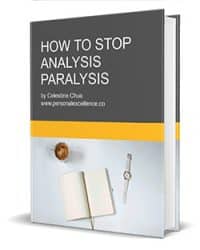
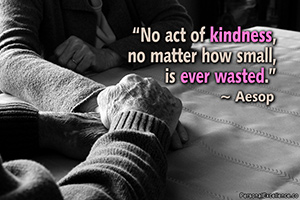
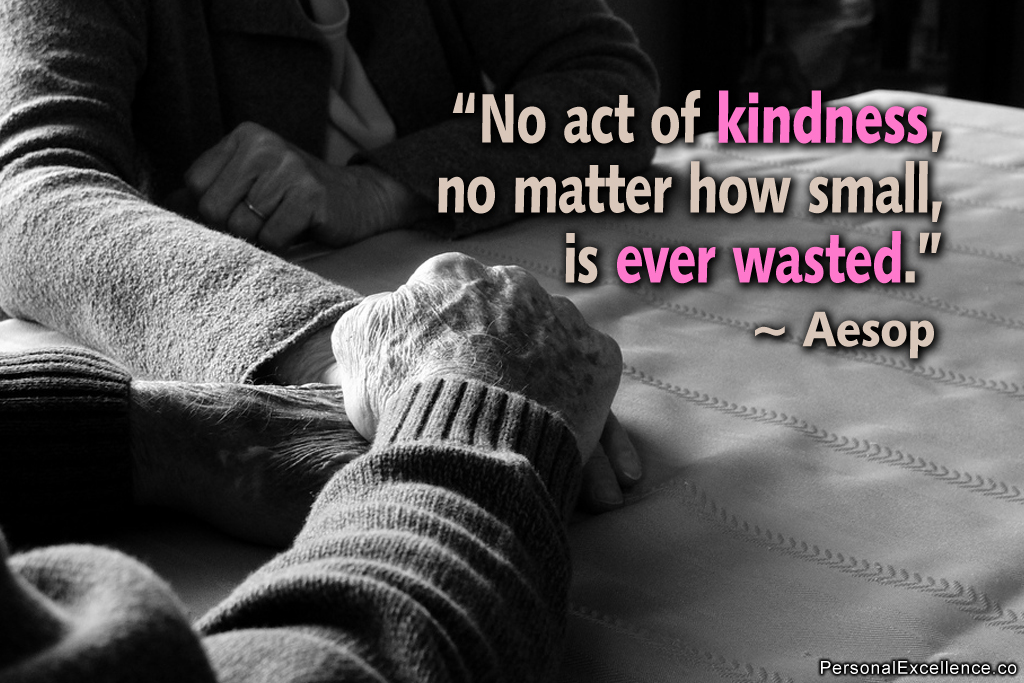
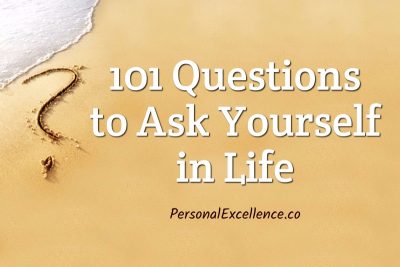



 I hope you find my content helpful. Join my community of 65,000 readers and get my latest articles delivered to your inbox. Your email is safe and I never send spam.
I hope you find my content helpful. Join my community of 65,000 readers and get my latest articles delivered to your inbox. Your email is safe and I never send spam.
Great article,really needed that.I have got my MCAT in a month and there
is so much uncertainty.But after reading this article,I am starting
anew.Thanks,Celestine!
Very true. Most people worried too much on the undesirable outcome. They missed the most important point. If we focus on the action and process, ensuring that the outcome will turn out the way we want it, the worry will go away.
This article is great! #2 is especially eye-opening for me. At the same time, it’s hard for me to employ…when I begin to worry about things it’s absolutely centered around the uncertainty at hand. I’ll try to take your advice here and just act as I would without it, but it’ll be hard!
Also, #1 is great advice, but one I over think as well. I always end up asking myself, “Is there something I can do?” and work myself into a frenzy trying to make sure I’ve exhausted every possibility so no one can say, “Well, you didn’t try -this-…” I do this even if what I “can” do isn’t practical. For a more extreme example, if something’s wrong with my friend (who lives a few hundred miles away from me), I may start to wonder if I should drive myself down to check on him. This would cause me to skip classes and get in trouble in other ways, but I see it as something I could potentially do something about. I have a hard time finding a line between “can I change something about this?” and, “what can I do, even if it requires me flipping my life upside down to do it?”
#3 is something I’ve surprisingly learned to do almost naturally, though that fluctuates with the amount and type of things going on in my life at any moment. Focusing on what’s important definitely helps though, as otherwise there’s just too much on your plate and you just drive yourself nuts!
As always, thanks for a great post! =D
I both love and hate uncertainty. On one hand it is the thrill of the unknown and the what ifs of what we are about to do that I love. On the other hand, I still have anxiety and worry too much about things that are out of my control.
I wish to travel alone and this will be the ultimate test for me. I suppose the only certain thing is the uncertainty of what will happen. Kind of exciting.
Hi celes, your articles are great ! And you are a very wonderful human being !
I have a small question for you, what are your hobbies?
Jay,
Universe.
Thanks Jay! My greatest passion is really to grow and help others grow. Hence, my hobbies all revolve around that. (Connecting with people, socializing, learning a new skill (whatever it may be at that time), traveling to connect with people of different cultures, etc.)
I loved this article! Today I started out as a Senior and I feel uncertain regarding my future(Though I have a clearer idea than my classmates) I was thinking of studying Confectioner, Culinary Arts and Bartender – Or just Confectioner – (Each course lasts only 1 year but are well teached with practice) but it’s something which I don’t know if I really want in my life. I’d love to make my own cupcake shop, I love making anything related with pastries but I also love publishing my comic books. I eventually realized I didn’t like writing as much as drawing my stories but I also love to blog about self-help which I’d like to do some time in the future but I also love teaching children and caring for animals. :/
I feel uncertain because I like so many things, I’m one of those Davinci people and anything related with art or creativity = inspiration to me. I can’t stay with one thing at a time so I think what I should do for now is forget about goal making and simply discover myself. Plan out one new art related activity each week since I’m at least sure my life purpose is express my art. Thank you so much for this article! :D
Hi Celes,
I really, really loved this article! Your suggestions for dealing with uncertainty are *extremely* wise and helpful, and I appreciate the personal examples you provided about how you’ve used them in your own life. Thank you for this! :)
~Christina
Hey Christina, thanks for your kind words! :D I always appreciate your positive energy and comments!
So very true and I had a curve ball day .Totally needed this… :cool: :)
Thank you soooo much for this!!! #3, while not exactly what I am currently looking at, is pretty darn close and is exactly what I needed to hear right now! I cannot thank you enough.
You’re welcome. Thanks for your kind words Stella and I’m glad you found the article useful. :D
I can definitely relate to the uncertainty part and honestly… it’s about work, something that I always felt would be a secure thing in my life, even if everything else was hectic around me. When I was layed off, the world tilted. I didn’t handle the uncertainty too well for the first week and a half. I immediately dove into looking for a job and sending out a ton of resumes.. when I had very few responses, that’s when it hit me, the uncertainty, even more.
I’m coping much better and I kind of wonder if it wasn’t God’s plan to throw me for a loop with the job… because when I found out about being pregnant…. it all just seems to .. well… “fit”..
I’ll have to refer back to this post for when I’m anxious about being uncertain again. Thanks!
Thanks Aleta! I didn’t mention this example in the post but many people often jump right into sending many resumes and trying to find a job (any job) once they leave their previous job (be it from retrenchment or because they left willingly). Much of it comes from being unable to cope with uncertainty with a lack of monthly income. The best approach is to embrace the uncertainty and react in a more sound and logical manner, by assessing their long-term career aspirations and applying for jobs that fit that, rather than jump into any next available job. Your example reminded me of this phenomenon among people I know, so thanks so much for bringing it up.
I want to :hug: you. Your article really gives hope to me. I was facing a lot of uncertainty. Thanks a lot.
You’re welcome sam. :)
Commenting for this post is closed.